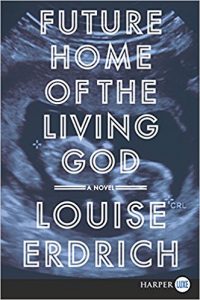
Published by Harper Collins Publishers
Minnesota based writer, Louise Erdrich, creates a grippingly smart and thought-provoking narrative in her latest work, Future Home Of The Living God. In this epistolary novel, readers follow protagonist Cedar Hawk Songmaker on an intense journey, where she examines her role as a daughter, mother, and lover, among other things, in the midst of a drastically changing world.
The novel is set in a future and dystopic Minnesota, where evolution has mysteriously stopped. In the interest of research and perhaps species survival, childbearing has become a matter of state security. Martial law is in full swing here and women are being rounded up. Cedar, who is four-months pregnant at the start of this “new” world, has much to lose.
Through the letters, Cedar simultaneously chronicles her pregnancy and her persecution. The maternal and tender account of the baby’s growth is juxtaposed with the harsh realities of Cedar’s capture. Readers are left grappling with themes of female urgency, body ownership, and resilience.
Though the novel’s first-person point-of-view and letter form provide readers with limited access to the outside world once Cedar is confined, Erdrich leaves hints of a quickly morphing physical world. Animals are changing in strange ways, “90 degrees is an unusually cool day for August,” and the first winter without snow has already come and gone. The result is a haunting and timely dystopian thriller.
In Future Home Of The Living God, Erdrich often capitalizes on the introspective and writerly nature of her characters. At points, readers see excerpts from Cedar’s novels, like Thomas Merton’s Raids on the Unspeakable; or letters from family members, like Eddy, who mails pages of his title-less book, which he calls an “argument against suicide.” The thoughts of Erdrich’s characters, whether communicated verbally or illustrated through in-text writing/literature, provide moments of deep mediation on huge philosophical and existential questions.
Even as the militarized setting informs the plot and conflict, stakes are raised by sprawling character contemplations on identity and family; past, present, and future; religion, biology, and natural law. We are pulled into the inner world of the characters, even as their outer world is disintegrating.—Ashley Richardson